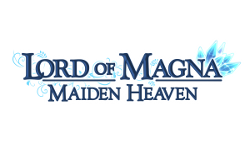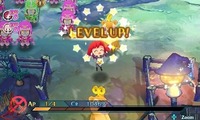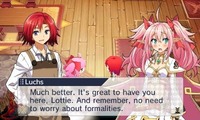|
|

|
PLATFORM
|
3DS
|
BATTLE SYSTEM
|

|
INTERACTION
|

|
ORIGINALITY
|

|
STORY
|

|
MUSIC & SOUND
|

|
VISUALS
|

|
CHALLENGE
|
Easy
|
COMPLETION TIME
|
Less than 20 Hours
|
|
OVERALL

|
+ Combat is enjoyable
+ Many catchy tunes
- Little interesting happens
- Poorly explained mechanics
|
Click here for scoring definitions
|
|
|
A promising concept is a terrible thing to waste. Lord of Magna: Maiden Heaven could have been any number of things, and it has numerous aspects that show potential. Instead the game squanders whatever intriguing notions it possesses in favor of plowing along a dull course that offers little to captivate any area of the imagination. Lord of Magna isn't a terrible game or an offensive one: it's just dull.
Luchs is the proprietor of a patron-less inn located in an extremely earthquake-prone region. These earthquakes open caves with valuable crystals, which Luchs is on the hunt for one day when bloodthirsty creatures suddenly appear and cut him off from the entrance. He fortunately finds a young woman with severe memory loss but considerable combat prowess, which she demonstrates by eliminating the dangers. Her name proves to be Charlotte, and soon enough she's joined by her six siblings, all of whom will eventually fill the empty rooms at Luchs' inn, but their problems stem from a dangerous adversary who must be stopped.
Lord of Magna's setting of an insanely isolationist land that has somehow allowed an inn to survive without customers in an earthquake-prone area for decades is deserving of far more narrative than it receives. When the central storyline appears, the potential of an antagonist usurping power on the level of a deity because of personal pain lacks interest. The confrontations which take place later in the game lack drama, because the story fails to imbue them with the necessary gravity and simply tosses them out. While numerous characters are in the game, they rarely say anything interesting and tend to blend together except for the token traits they possess. XSEED's localization work is fine, but it can't enliven a moribund script.
Lord of Magna's combat is somewhat entertaining at least. It superficially resembles Shining Force Feather's tactical system of characters being able to move around the combat zone within a certain radius of the starting point, and each combatant has a unique move and attack range. Enemies tend to come with a host of feeble servants surrounding them that die with the slightest touch, but can be recreated at the cost of some foe HP. These irritants rarely do more than clog the battlefield by removing room for maneuver, but most characters can hit many of them with a single strike to somewhat reduce the glut. Knocking large numbers of them down like bowling pins is entertaining though, and combat's core tenets hold up through the game.
 Oh man, is his head going to get any bigger? I don't think he can move if it does.
Oh man, is his head going to get any bigger? I don't think he can move if it does.
|
|
There are bothersome parts to the combat though, one of them being the deep HP pool many enemies have. Foes won't stop summoning fresh cannon fodder to get in the way until relatively low on life, and depleting their large life bars can take several turns for non-bosses. Characters can get an extra turn by taking out ten or more of the weakling enemies in one move, but this almost never happens due to the difficulty of setting up an effective chain attack zone. Character levels are paramount due to the lack of equipment, and grinding for a bit is a superb means of reducing enemy damage output to inconsequential amounts. Increasing the difficulty only gives enemies more HP, removing much incentive for tactical gamers seeking an interesting challenge. Due to the inability of friendly units to walk through each other, some narrow areas can also be annoying to move through. One chapter also eschews combat entirely, instead forcing the player through a series of questions with one correct answer, a process that is unwelcome at the start and positively infuriating by the end.
There is a means of customizing characters by equipping various skills, but the game gives it a cursory mention and never goes into its tenets, letting the player fumble around with it instead. The skills unlocked are limited somewhat by elemental affinity, but a significant variety is present. Since the only other way to heal in a battle is with items, giving someone a healing skill is of paramount concern. Creating the skills is done through a tedious item fusion process in which the player manually selects components by scrolling through the entire list of available materials, which does a good job of limiting the amount of time spent on it.
The other way of influencing character growth is to build up a relationship between the girls and Luchs. This is done by keeping an eye peeled for a heart icon over one of them during the periods between battle, and accepting whatever proposal the girl makes of him. Invariably this notion will lead to her and Luchs fighting a few enemies by themselves, but also improving their relationship and unlocking a new technique. Getting all of them in one playthrough is impossible, forcing the player to concentrate on just a couple of the girls at a time. Strengthening relationships in this way is also the means by which anything even slightly sensual is unlocked, but the standard audience for this sort of thing will probably be disappointed when nothing more revealing than a swimsuit is seen.
 Lottie's expression is a coincidence, nothing untoward is going to happen.
Lottie's expression is a coincidence, nothing untoward is going to happen.
|
|
Each character simultaneously appears onscreen with an illustrated upper body portrait while speaking, and with a strangely deformed sprite. There is a disconnect from this approach, in which the same character is depicted with uncomplementary visual styles. Otherwise the visuals are workmanlike, displaying an unimpressive variety of enemies and a host of environments that get the job done without coming across as unique.
Lord of Magna sports some catchy tunes during battle that help make the time pass more enjoyably, some of them reminiscent of rocking Falcom scores. There is also a smattering of voice acting in battle and story scenes, with most of the latter popping up at haphazardly chosen moments instead of according to any detectable pattern. The performances are fine, but battle cries in particular demand a larger variety than is provided, making them wear out their welcome.
While there is plenty of opportunity to spend more time with the game, getting through the core storyline can be accomplished in fifteen or so hours. I felt no real desire to spend any more time in Lord of Magna, and will likely forget most of what I experienced in a few months. While it's not quite at the level to warrant George Carlin's famous comparison to the act of viewing a golf game, getting anywhere near that area is not an accomplishment a developer should ever want.
Review Archives
|









